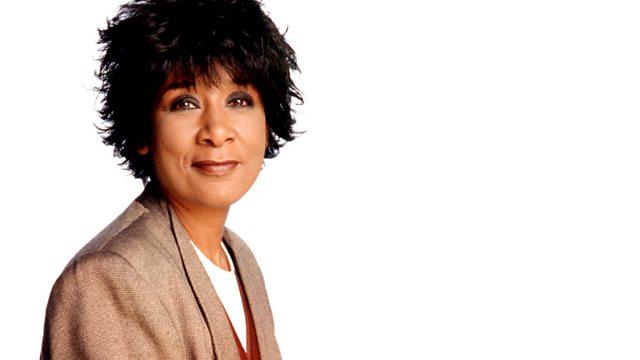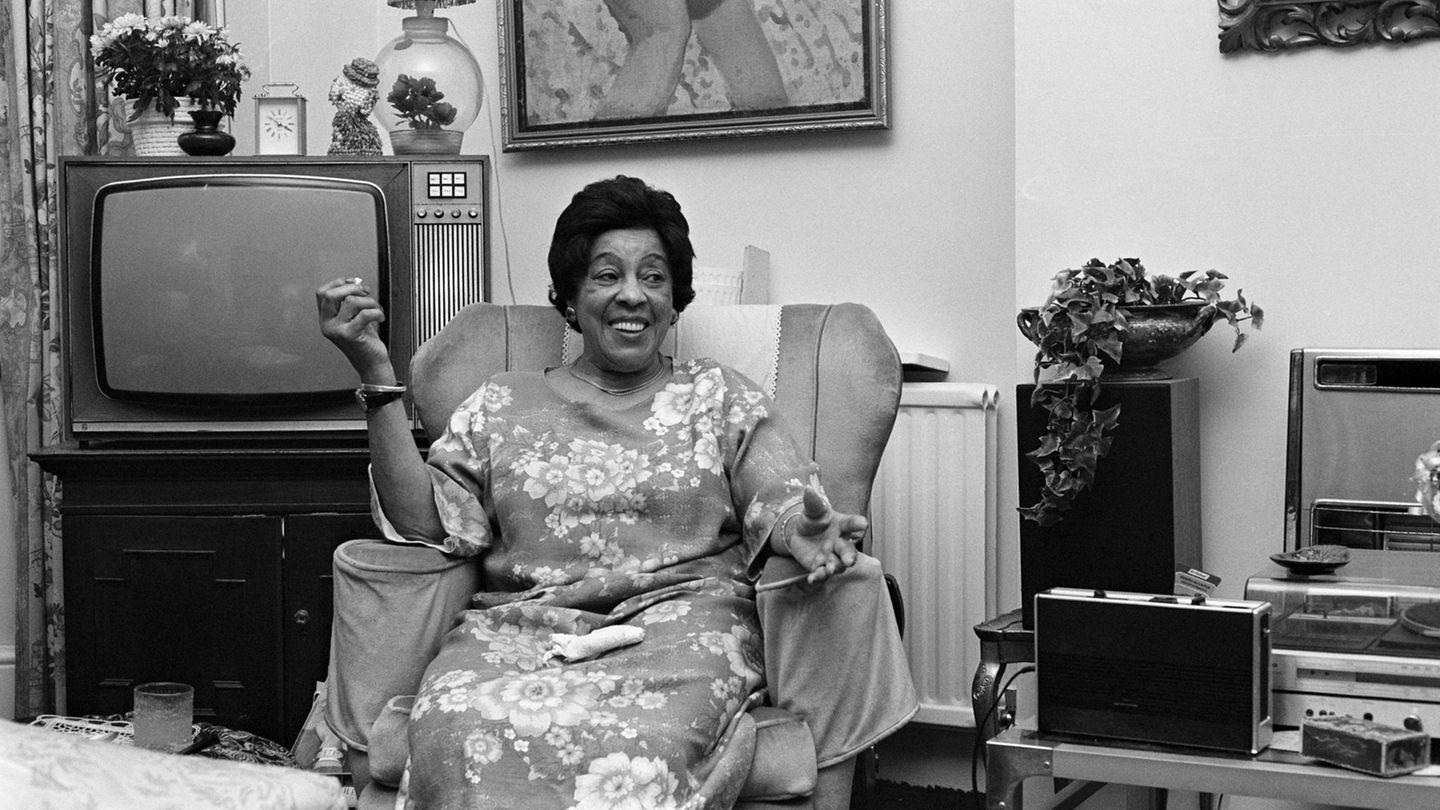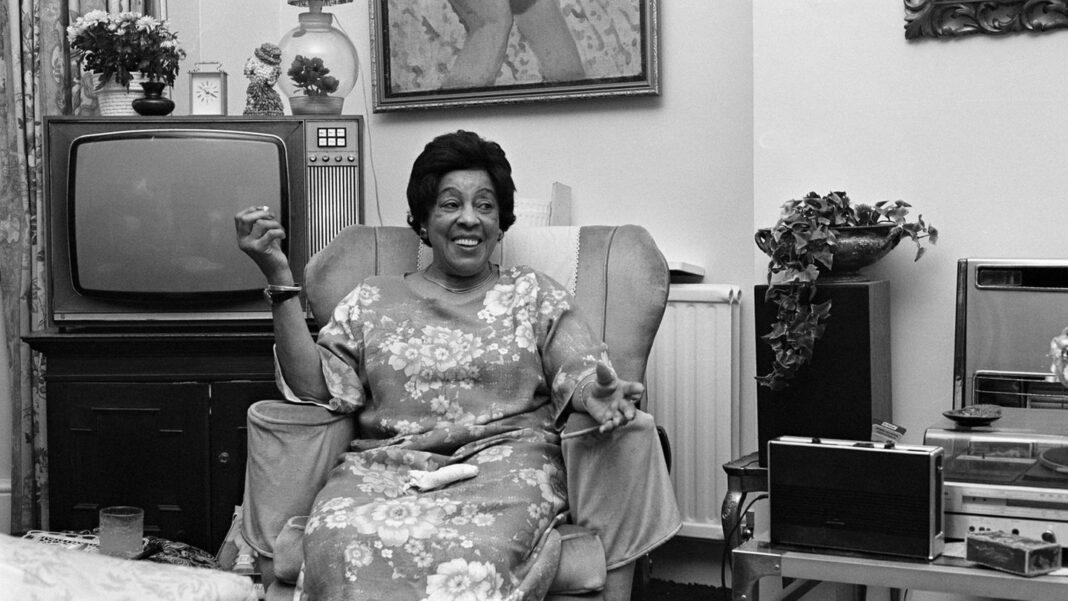Adelaide Hall was a Harlem and UK-based jazz singer and entertainer. Her long career spanned more than 70 years from 1921 until her death and she was a major figure in the Harlem Renaissance.
Hall entered the Guinness Book of World Records in 2003 as the world’s most enduring recording artist having released material over eight consecutive decades.
Adelaide Hall Biography

Adelaide Hall was born in Brooklyn, New York (but she was all Harlem), to Elizabeth and Arthur William Hall. Hall began her stage career in 1921 on Broadway in the chorus line of Noble Sissle’s and Eubie Blake‘s hit musical Shuffle Along and went onto appear in a number of similar black musical shows including Runnin’ Wild on Broadway in 1923, in which she sang James P. Johnson’s hit song “Old-Fashioned Love.”hy
In 1925, Hall toured Europe with the Chocolate Kiddies revue that included songs written by Duke Ellington. In 1926, Hall appeared in the short-lived Broadway musical My Magnolia that had a score written by Luckey Roberts and Alex C. Rogers, after which she appeared in Tan Town Topics with songs written by Fats Waller. Hall then starred in Desires of 1927, (with a score written by Andy Razaf and J. C. Johnson), which toured America from October 1926 through to September 1927.
In 1924, Hall married a British sailor Bertram Errol Hicks, born in Trinidad and Tobago. Soon after their marriage he opened a short-lived club in Harlem, New York, called ‘The Big Apple‘ and became her official business manager.
Hall was hired to join the cast of the Chocolate Kiddies revue in New York, where they rehearsed before setting sail for Europe. The initial tour started at Hamburg, Germany, on 17 May 1925, and ended in Paris, France in December 1925 visiting many major cities in-between.

The revue was designed to give Europeans a sampling of black entertainment from New York. Included in the cast were The Three Eddies, Lottie Gee, Rufus Greenlee and Thaddeus Drayton, Bobbie and Babe Goins, Charles Davis and Sam Wooding and his Orchestra. After the initial tour disbanded, Sam Wooding and his Orchestra continued touring the Chocolate Kiddies revue for several years later.
In 1926, upon Hall’s return to New York after touring Europe with the Chocolate Kiddies, she was featured in Tan Town Topics, a revue containing songs written by Fats Waller and Spencer Williams. The cast included Fats Waller, Eddie Rector and Ralph Cooper, Adelaide Hall, Maude Mills, Arthur Gaines, Leondus Simmons and a dance troupe called the Tan Town Topics Vamps.
The show opened at Harlem’s Lafayette Theatre on 5 April followed by a short road tour on the eastern Theater Owners Booking Association (TOBA) circuit taking in Baltimore, Chicago and Philadelphia.
During July 1926, Hall appeared in residency with Lottie Gee and the Southern Syncopated Orchestra at Small’s Paradise, New York. On Tuesday, 5 October, Hall appeared again at Small’s Paradise at a special party, “Handy Night”, hosted by the venue to honor W. C. Handy and to celebrate the release of his newly published book Blues: An Anthology—Complete Words and Music of 53 Great Songs. For entertainment, Adelaide Hall, Lottie Gee, Maude White, and Chic Collins provided a selection of jazz and blues numbers.
Adelaide Hall Career

From October 1926, Hall toured America playing the TOBA circuit until September 1927 in the highly praised show Desires of 1927, conceived by J. Homer Tutt and produced by impresario Irvin C. Miller. As the Pittsburgh Courier noted: “Adelaide Hall and assistants have some show.
Speed, pretty girls, catchy music, a touch of art, which touches the border line of nudity – the names of such well-known stage celebrities as Adelaide Hall, J. Homer Tutt, Henry ‘Gang’ Jones, the Harmony, Trio, Charles Hawkins, Arthur Porter, ‘Billy’ McKelvey and Clarence Nance.”
Billed as the star ‘soubrette’ of the show, Adelaide’s performance included several songs, (most notably “Sweet Virginia Bliss”), flat foot dancing and accompanying herself on the ukulele whilst singing.
In October 1927, Hall recorded her wordless vocals on “Creole Love Call”, “The Blues I Love To Sing” and “Chicago Stomp Down” with Duke Ellington and his Orchestra. The recordings were worldwide hits and catapulted both Hall’s and Ellington’s careers into the mainstream.
The story behind “Creole Love Call”‘s conception is interesting to recount: In 1927, Hall and Duke Ellington were touring in the same show, Dance Mania. The show opened at the Lafayette Theatre in Harlem on 14 November and played there for one week before traveling to Philadelphia, Pennsylvania, to appear at the Standard Theatre. Hall closed the first half of the bill and Duke was on in the second.
Duke had a new number, “Creole Love Call”, which he included in his set. Hall recounted, “I was standing in the wings behind the piano when Duke first played it (“Creole Love Call”). I started humming along with the band. He stopped the number and came over to me and said, ‘That’s just what I was looking for. Can you do it again?’ I said, ‘I can’t, because I don’t know what I was doing.’ He begged me to try.
Anyway, I did, and sang this counter melody, and he was delighted and said ‘Addie, you’re going to record this with the band.’ A couple of days later I did”. When Duke was recounting the incident to a reporter he explained, “We had to do something to employ Adelaide Hall,” and then added, “I always say we are primitive artists, we only employ the materials at hand … the band is an accumulation of personalities, tonal devices.”
On 4 December 1927, Ellington and his Orchestra commenced their residency at Harlem’s Cotton Club in a revue called Rhythmania. The show featured Hall singing “Creole Love Call”. In 1928, “Creole Love Call” entered the Billboard song charts at #19 (USA).
On 7 January 1933, Hall and Duke Ellington and his Famous Orchestra recorded “I Must Have That Man” and “Baby”.
In 1928, Hall starred on Broadway with Bill “Bojangles” Robinson, Tim Moore and Aida Ward in Blackbirds of 1928. The show became the most successful all-black show ever staged on Broadway at that time and made Hall and Bojangles into household names.
Blackbirds of 1928 was the idea of impresario Lew Leslie, who planned to build the show around Florence Mills in New York after her success in the hit London show Blackbirds but Mills died of pneumonia in 1927 before rehearsals commenced. Hall was chosen to replace her.
The revue opened at Les Ambassadeurs Club in New York in January 1928, under the name Blackbird Revue, but it was renamed Blackbirds of 1928 and in May 1928 transferred to Broadway’s Liberty Theatre, where it ran for 518 performances. After a slow start, the show became the hit of the season. Hall’s performance of “Diga Diga Do”, created a sensation.
Her mother was so incensed when she went to see the show by her daughter performing what she termed ‘risqué dance moves’, she tried to stop the show during Adelaide’s performance and banned her from appearing in any future performances. The ban only remained for one performance and Adelaide returned triumphantly to her role the following day.
It was reported in the press of the day that the show’s producer Lew Leslie was so concerned about race violence connected with the controversy surrounding Adelaide’s performance that he took out a hefty insurance policy to cover the cast; the most heavily insured were the principals, Adelaide Hall and “Bojangles” Robinson.
It was this musical that not only secured Hall’s success in the USA but also in Europe when the production was taken in 1929 to Paris, France, where it ran for four months at the Moulin Rouge.
When Adelaide Hall arrived in Paris from America at the Gare Saint-Lazare she was greeted by a reception of fans and reporters that was reported to be as large as the reception Harlem’s Charlie Chaplin had received two years earlier when he visited Paris.
The French artist Paul Colin illustrated several posters to advertise Blackbirds run at the Moulin Rouge including one entitled “Le Tumulte Noir – Dancer in Magenta” that captures Hall’s performance beautifully, as she is dancing and waving her arms about.[ An original vintage poster of Adelaide Hall by Paul Colin advertising Blackbirds at the Moulin Rouge sold on 2 October 2003 at Swann Auction Galleries in New York for $167,500. In Europe, Hall rivalled Josephine Baker for popularity on the European stage.
Vu (magazine) issue N°77 Au revoir Black Birds! (04 09 1929) Adelaide Hall on the front cover of Vu (magazine) as the French say farewell to Blackbirds after their tenure at the Moulin Rouge.
With Blackbirds′ music score written by Jimmy McHugh and lyrics by Dorothy Fields, Hall’s performances of the songs “I Can’t Give You Anything but Love, Baby”, “Diga Diga Do”, “Bandanna Babies” and “I Must Have That Man” made them into household hits, and they continued to be audience favorites throughout her long career.
At the end of Blackbirds tenure at the Moulin Rouge, to thank the cast for their successful run and to welcome in the forthcoming Thanksgiving Day, Lew Leslie threw a big party held in the Paris suburb of Authie and, as well as the cast, invited a host of visiting luminaries including the visual artist Man Ray, lyricist Ira Gershwin, writer James Joyce, German composer Kurt Weill, American composer William Grant Still and producer Clarence Robinson.
A rare group photograph was taken at the event in which Adelaide Hall is seated in the center surrounded by guests including actress and music hall star Mistinguett, recently surfaced and was sold at Swann Auction Galleries, New York for $2,640.
The Blackbirds cast sailed from France back to the US in the fall of 1929 and upon their arrival almost immediately commenced a road tour of the States opening at the Adelphi Theatre, Chicago, on the evening of 26 November. It was in Chicago during December that Adelaide Hall unexpectedly quit the production and hastened home to New York.
Adelaide Hall Age
Adelaide Hall was born on October 20, 1901 and died on November 7th, 1993; hence, she was 92 years before her demise.
Adelaide Hall parent
Her parent are yet to be updated
THANK YOU for constantly reading stories on AtinkaNews. You are free to share this story via the various social media platforms . Kindly follow us on Facebook, Instagram and Telegram.



